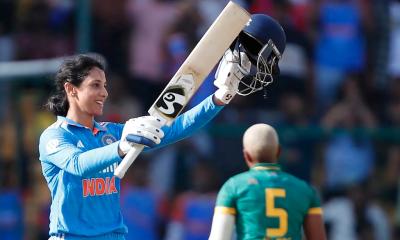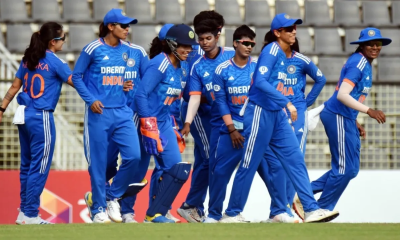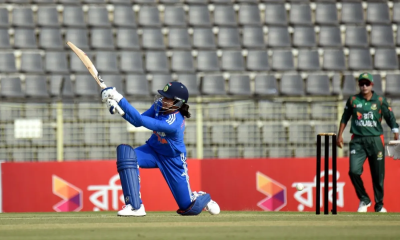Latest News
Bowlers set up Australia’s series levelling win

In a cagey contest at the DY Patil Stadium in Navi Mumbai on Sunday evening, Australia secured a 6-wicket win over India in the second T20I to level the three-match series 1-1. The visitors restricted India to 130 for 8 after electing to field before overhauling the total with one over to spare.
Following India’s complete dominance in the first T20I, Australia admitted to ‘debriefing’ and coming up with better plans for the conditions in the second contest. It started with Kim Garth dismissing Shafali Verma and Jemimah Rodrigues early. The movement on offer helped the Australian pacers.
Even through the middle overs, there weren’t easy runs on offer for the Indians as Smriti Mandhana and Harmanpreet Kaur struggled to get going. Annabel Sutherland and Georgia Wareham in specific were economical. Deepti Sharma was forced to push the accelerator with more aggressive play, and in company of Richa Ghosh added 33 runs in only 18 balls, before the latter fell. However, India’s attempt to continue the assault proved counter-productive as they kept losing wickets in quick succession, with Wareham and Sutherland bagging a brace each.
Shreyanka Patil also attempted to be unorthodox with her strokeplay but were eventually restricted to 130 for 8.
After a cautious start, Alyssa Healy cut loose against Titas Sadhu, cracking a couple of boundaries in the second over. She continued the assault against Shreyanka as well. Five wides by Renuka Thakur also helped Australia’s case as they piled on 47 runs in the powerplay.
Deepti struck twice in her first seven deliveries, getting Healy to inside edge the ball on to her stumps and having Beth Mooney stumped with a flighted delivery. Just when India was looking to control the scoring rate, Tahlia McGrath and Perry went on the offensive against Amanjot Kaur, smashing four boundaries in the two overs by the medium pacer. The former eventually fell while attempting to reverse sweep against Shreyanka only to glove it to the ‘keeper, and two overs later, Pooja Vastrakar had Ash Gardner caught behind with an outswinging delivery.
In what seemed like an opportunity for India to apply the pressure back on the visitors late in the contest was dusted courtesy the in-form Pheobe Litchfield unorthodox play. She brought out her range of strokes, and with Shreyanka failing to grip the ball, there were ample scoring opportunities. In the last ball of the 19th over, Perry, playing her 300th international match, tonked a slogsweep over the mid wicket fence for a six, to complete the run chase.
Brief Scores:
India 130/8 in 20 overs (Deepti Sharma 30, Richa Ghosh 23; Georgia Wareham 2-17, Annabel Sutherland 2-18) lost to Australia 133/4 in 19 overs (Ellyse Perry 34*, Alyssa Healy 26; Deepti Sharma 2-22) by 6 wickets.
Latest News
UK Supreme Court backs ‘biological’ definition of woman
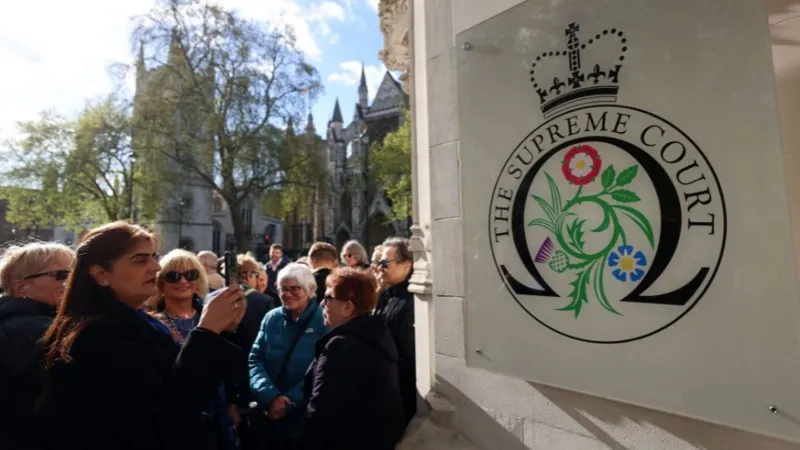
The UK Supreme Court has unanimously backed the biological definition of “woman” under the 2010 Equality Act.
It marks the culmination of a long-running legal battle which could have major implications for how sex-based rights apply across Scotland, England and Wales.
Judges sided with campaign group For Women Scotland, which brought a case against the Scottish government arguing that sex-based protections should only apply to people that are born female.
Judge Lord Hodge said the ruling should not be seen as a triumph of one side over the other, and stressed that the law still gives protection against discrimination to transgender people.
The Scottish government argued in court that transgender people with a gender recognition certificate (GRC) are entitled to the same sex-based protections as biological women.
The Supreme Court was asked to decide on the proper interpretation of the 2010 Equality Act, which applies across Britain.
Lord Hodge said the central question was how the words “woman” and “sex” are defined in the legislation.
He told the court: “The unanimous decision of this court is that the terms woman and sex in the Equality Act 2010 refer to a biological woman and biological sex.
“But we counsel against reading this judgement as a triumph of one or more groups in our society at the expense of another, it is not.”
He added that the legislation gives transgender people “protection, not only against discrimination through the protected characteristic of gender reassignment, but also against direct discrimination, indirect discrimination and harassment in substance in their acquired gender”.
Campaigners who brought the case against the Scottish government hugged each other and punched the air as they left the courtroom, with several of them in tears.
The Equality Act provides protection against discrimination on the basis of various characteristics, including “sex” and “gender reassignment”.
Judges at the Supreme Court in London were asked to rule on what that law means by “sex” – whether it means biological sex, or legal, “certificated” sex as defined by the 2004 Gender Recognition Act.
The Scottish government argued the 2004 legislation was clear that obtaining a GRC amounts to a change of sex “for all purposes”.
For Women Scotland argued for a “common sense” interpretation of the words man and woman, telling the court that sex is an “immutable biological state”.
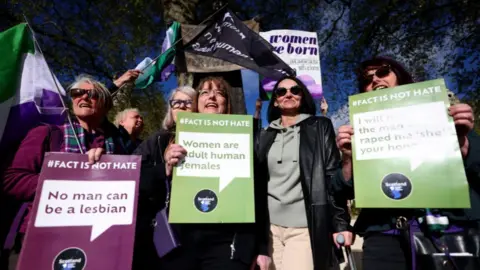
Outside the Supreme Court, For Women Scotland co-founder Susan Smith said: “Today the judges have said what we always believed to be the case, that women are protected by their biological sex.
“Sex is real and women can now feel safe that services and spaces designated for women are for women and we are enormously grateful to the Supreme Court for this ruling.”
A UK government spokesman said: “This ruling brings clarity and confidence, for women and service providers such as hospitals, refuges, and sports clubs.
“Single-sex spaces are protected in law and will always be protected by this government.”
Conservative leader Kemi Badenoch described the ruling as a “victory for all of the women who faced personal abuse or lost their jobs for stating the obvious”.
But Scottish Green MSP Maggie Chapman, a prominent campaigner for trans-rights, said: “This is a deeply concerning ruling for human rights and a huge blow to some of the most marginalised people in our society.
“It could remove important protections and will leave many trans people and their loved ones deeply anxious and worried about how their lives will be affected and about what will come next.”
The Scottish government has not yet commented on the ruling.
[BBC]
Latest News
We should start working collectively to rebuild the country -PM
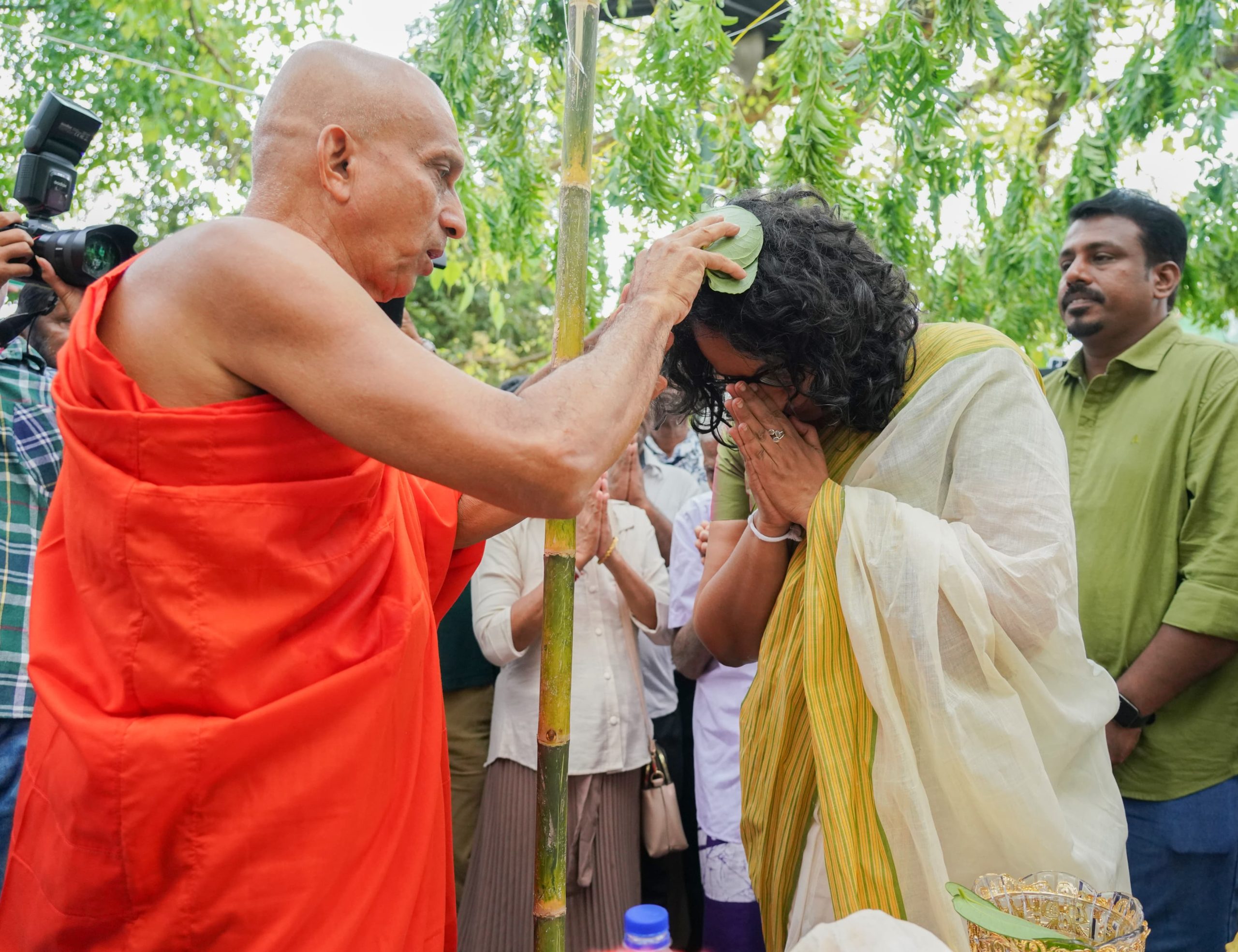
The oil anointing ceremony for the Sinhala and Tamil New Year was held on April 16 at the historic Rajamaha Viharaya in Kolonnawa, with the participation of Prime Minister Dr. Harini Amarasuriya.
Following the chanting of pirith, the oil anointing ritual was carried out at the auspicious time of 9:04 a.m., by the Chief Incumbent of the temple, Venerable Kolonnawa Dhammika Thero.
Speaking after the ceremony the Prime Minister said that:
“The Sinhala and Tamil New Year is one of the most important festivities in our country. It is a celebration with our families, reflecting our traditions and customs while strengthening the ties.
This festival leads the path for renewing unity, love, and bonds stronger. These values enrich a country. Development of a country is not limited by one-dimensional; a true development includes spirituality, relationships, and connections. The reason why we uphold these customs in such ceremonies is to remind ourselves of the significance and to pass on their value to future generations.
Therefore, today marks a significant day. Throughout this week, we came together and engaged in various activities. Followed by, the next event will mark the leaving for employment at the auspicious time and we should start working collectively to rebuild the country.
I wish everyone a New Year that is prosperous, peaceful, joyful, full of strengthened relationships, and most importantly, safe for all.”
The ceremony was graced by the presence of the Maha Sangha, and attended by the Deputy Minister of Youth Affairs Eranga Gunasekara, Divisional Secretary to Kolonnawa Priyanath Perera, Municipal Secretary Nelum Kumari Gamage, and the residents of the area.
[Prime Minister’s Media Division]
Latest News
India’s Gandhis charged in money laundering case amid opposition outcry
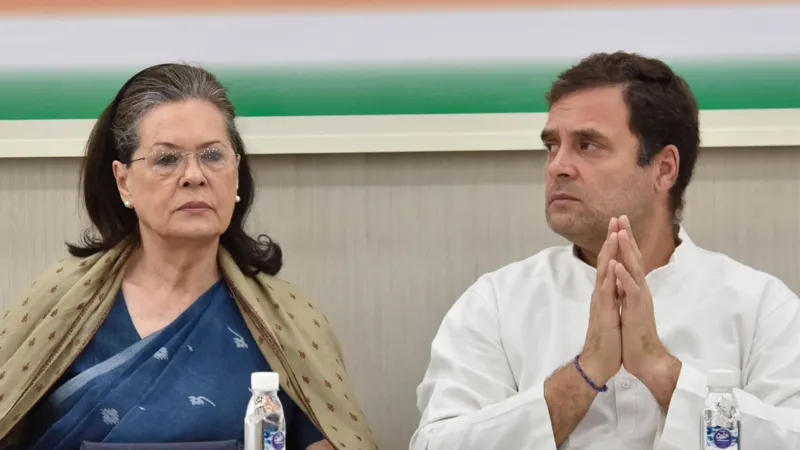
India’s opposition Congress party has said it will organise nationwide protests on Wednesday after the country’s financial crimes agency charged senior leaders Sonia and Rahul Gandhi and others with money laundering.
The Enforcement Directorate (ED) presented its findings in a Delhi court on Tuesday, accusing the Gandhis of forming a shell company to illegally acquire assets of the National Herald newspaper worth more than 20bn rupees ($233mn; £176mn).
Congress spokesperson Jairam Ramesh called the charges “politics of vendetta and intimidation” by the government.
The Gandhis who have previously denied any wrongdoing have not commented on the charges.
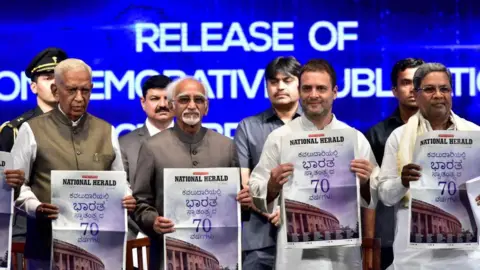
The investigation also names other members of the Congress party, including its overseas chief Sam Pitroda, according to news agency ANI.
The Enforcement Directorate (ED) began investigating the case in 2021 after a private complaint filed by Subramanian Swamy, a member of the governing Bharatiya Janata Party (BJP).
Swamy alleged that the Gandhis used party funds to take over Associated Journals Limited (AJL), which published the now-defunct National Herald newspaper, and illegally acquired properties worth millions through AJL.
The Congress maintains that it bailed out the publisher due to its historical legacy and had lent more than 900m rupees to AJL over the years.
In 2010, AJL became debt-free by swapping its debt for equity and assigning the shares to a newly created company called Young Indian, which the party says is a “not-for-profit company” with no dividends paid to its shareholders and directors.
Sonia and Rahul Gandhi are among Young Indian’s directors and they each own 38% of the company. The remaining 24% is owned by Congress leaders, including Motilal Vora and Sam Pitroda.
Last week, the Enforcement Directorate said Young Indian had acquired AJL properties worth 20bn rupees for just 5m, significantly undervaluing their worth.
It also served several notices to seize assets worth 6.6bn rupees across several Indian cities – including Delhi and Mumbai – which are connected to Young Indian.
The case is scheduled to come up for hearing on 25 April.
In recent years, the opposition has repeatedly accused the Narendra Modi government of weaponising the Enforcement Directorate against its political opponents.
According to data compiled by Reuters in 2024, the agency has summoned, questioned or raided around 150 opposition politicians since Modi came to power in 2014.
Last year, the ED arrested former Delhi chief minister Arvind Kejriwal in connection with an alleged liquor scam just a month before key general elections. He spent five months in jail before being freed on bail.
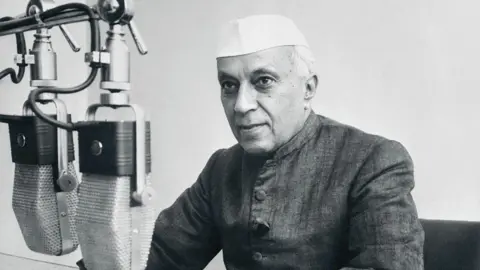
What is the National Herald?
The National Herald newspaper was founded in 1938 by Jawaharlal Nehru, India’s first prime minister and Rahul Gandhi’s great-grandfather.
It ceased publication in 2008 after running into financial troubles but was later acquired by the Congress in 2010 and relaunched as a digital news outlet in 2017.
It was published by Associated Journals Limited (AJL), which was established in 1937 with 5,000 freedom fighters as shareholders. AJL also published Qaumi Awaz in Urdu and Navjeevan in Hindi.
The National Herald became known for its association with India’s freedom struggle and its nationalist stance.
Nehru often wrote strong-worded columns, which led to the British government banning the paper in 1942. It reopened three years later.
After India gained independence in 1947, Nehru resigned as chairman of the newspaper to become prime minister.
But the Congress continued to play a huge role in shaping the newspaper’s ideology.
In a message to the National Herald on its silver jubilee in 1963, Nehru spoke about the paper “generally favouring Congress policy” while maintaining “an independent outlook”.
Over the years, the National Herald grew to be a leading English daily, supported by the Congress party, until it shut down in 2008 after years of financial troubles.
[BBC]
-

 News5 days ago
News5 days agoSuspect injured in police shooting hospitalised
-

 Features6 days ago
Features6 days agoRobbers and Wreckers
-

 Business5 days ago
Business5 days agoSanjiv Hulugalle appointed CEO and General Manager of Cinnamon Life at City of Dreams Sri Lanka
-

 Business6 days ago
Business6 days agoBhathiya Bulumulla – The Man I Knew
-

 Business7 days ago
Business7 days agoNational Anti-Corruption Action Plan launched with focus on economic recovery
-

 Features4 days ago
Features4 days agoLiberation Day tariffs chaos could cause permanent damage to US economy, amid global tensions
-

 Business4 days ago
Business4 days agoMembers’ Night of the Sri Lanka – Russia Business Council of The Ceylon Chamber of Commerce
-
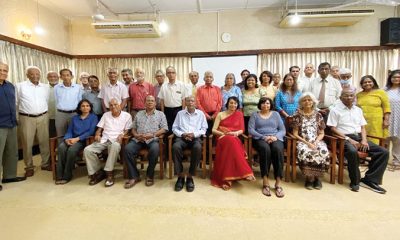
 Features4 days ago
Features4 days agoMinds and Memories picturing 65 years of Sri Lankan Politics and Society


